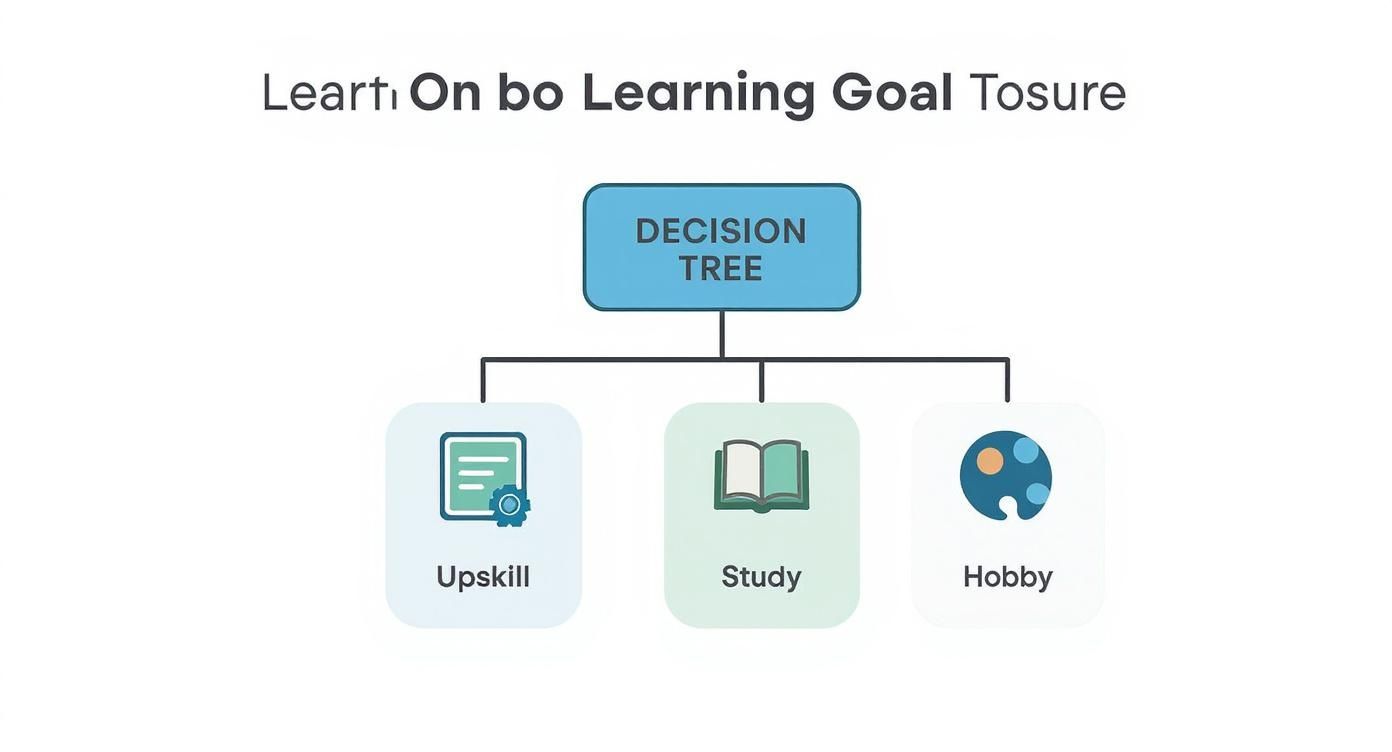Finding the Best Online Class Singapore
Online classes in Singapore have moved far beyond being a simple backup plan. They're now a primary route for achieving top grades, climbing the career ladder, and even just learning something new for fun. This isn't a small trend; it's a major shift in how Singaporeans approach education, all thanks to incredible flexibility, strong government backing, and top-tier digital infrastructure.
Getting to Grips with Singapore's E-Learning Scene
The surge in demand for virtual learning has completely shaken up education here, creating a vibrant and competitive space. This change is fuelled by a mix of national strategic goals and the day-to-day realities of life in a fast-moving city. Whether you're a student grinding for your A-Levels or a professional eyeing that next promotion, online courses offer customised learning paths that traditional classrooms often can't match.
What's Fuelling the Growth in Online Education?
This explosion in online learning didn't just happen overnight. A few key elements have come together to really push it forward:
- Government Support: The SkillsFuture initiative has been a game-changer. It gives Singaporeans credits to put towards a massive range of approved courses, making it much easier and more affordable for everyone to keep learning.
- Tech-Savvy Population: Singapore's high-speed internet and high digital literacy mean that practically everyone is ready and able to jump onto modern e-learning platforms without a hitch.
- A Perfect Fit for Busy Lives: The choice between self-paced (asynchronous) and live (synchronous) online classes means learning can finally fit into the hectic schedules of students and working professionals.
This move to digital-first learning is about more than just logging on from home. It's a strategic effort to cultivate a skilled, adaptable workforce that's ready for whatever the global economy throws its way.
Just How Big is the Market?
To say the online education market in Singapore is growing would be an understatement. It's booming.
The numbers are pretty staggering. Valued at roughly USD 383 million in 2024, the market is expected to skyrocket to almost USD 2.77 billion by 2033. A huge driver for this is how we use technology in our daily lives; an incredible 95% of Singaporean students use their smartphones for learning. This signals a massive appetite for courses that are interactive and accessible on the go.
This expanding scene is packed with opportunities, whether you're aiming to code, prepping for university, or picking up a new language. The good news is that the core principles for finding a great provider are the same across the board, similar to how one might look for the best online English classes in Singapore. By understanding what’s out there, you'll be in a much better position to pick a course that genuinely delivers on its promises.
Finding Your "Why": The First Step to the Right Spanish Class
Jumping into the search for an online Spanish class without a clear goal is a bit like hopping on the MRT without knowing your stop. You'll definitely go somewhere, but it's probably not where you intended. The best way to find the perfect online Spanish class in Singapore for you or your child starts with one simple question: what do you actually want to achieve?
This isn't just about "learning Spanish." It's about getting specific. Are you a professional who needs business Spanish to clinch a deal with a client in Madrid? Or maybe you’re a student aiming to ace your IB Spanish exam. Perhaps you're just dreaming of ordering tapas confidently on that long-awaited trip to Barcelona. Each of these goals points to a very different kind of class.
What’s Your Main Motivation?
To get a clearer picture, it helps to figure out which of these broad categories you fall into. Most people are looking for a Spanish class for one of three reasons, and knowing yours will make the search so much easier.
- For Career Growth: This is all about gaining a skill that directly benefits your job. You're probably looking for practical, real-world language skills, maybe even an official certification. Think of an executive who needs conversational fluency for meetings or a hospitality professional aiming to better serve Spanish-speaking tourists. The focus here is on tangible results.
- For Academic Success: This is a big one for students, from secondary school to university level. The goal is to support school learning, crush exams like the GCE A-Levels or the DELE (Diplomas of Spanish as a Foreign Language), or simply get a better grip on a tough subject. Curriculum alignment and experienced tutors who know the exam formats are key.
- For Personal Passion: This is learning for the sheer joy of it. You might want to connect with your partner's family, dive into the world of Almodóvar films without subtitles, or simply challenge yourself with a new skill. The priority here is a fun, engaging, and flexible learning experience.
Once you've pinned down your primary driver—professional, academic, or personal—your search becomes much more focused. You can immediately filter out the providers that don't specialise in what you need, saving you a ton of time and effort.
Matching Your Goal to the Right Class Format
After you know why you're learning, the next piece of the puzzle is how you want to learn. The way an online class is structured can make or break your experience.
For example, a professional who needs to quickly build conversational confidence should probably look for synchronous (live) classes. These sessions offer real-time interaction with native-speaking teachers and other students, which is fantastic for practising your speaking and getting instant feedback. It’s the closest you'll get to an in-person class, complete with networking opportunities.
On the other hand, a university student juggling a hectic schedule might find an asynchronous (self-paced) course to be a better fit. This gives them the freedom to watch video lessons and complete exercises whenever they have a spare moment—late at night, between lectures, you name it. For a hobbyist, a blended approach could be perfect: self-paced modules to learn grammar at your own speed, plus optional live group sessions to practise speaking.
Thinking about these practical scenarios helps you look past the marketing slogans. It pushes you to consider how a course's design will actually support your progress towards that goal you set right at the start.
How to Evaluate Online Course Providers
So, you’ve pinpointed your learning goals. Fantastic. Now comes the real work: wading through the sea of online course providers to find a gem. With so many options for an online class in Singapore, it's easy to get swayed by a flashy website. But as anyone who's been disappointed knows, great marketing doesn't always equal a great learning experience.
This part of the process is all about looking under the bonnet. We need to check the fundamentals: Who’s actually doing the teaching? What will I learn, and how? Is the technology going to help me or hinder me? Getting solid answers to these questions is how you make a smart investment in your education.
Scrutinising Instructor Credentials And Experience
Let's be blunt: an online class is only as good as its instructor. A name and a professional headshot aren't enough. You need to look for real, tangible proof of their expertise and, just as importantly, their ability to teach.
Start with their qualifications. For an academic subject like Spanish, this should mean a relevant degree from a solid university. For a more skills-based course, you'd look for significant industry experience or professional certifications. A provider worth their salt will be upfront and proud of their instructors' backgrounds.
But qualifications are only half the story. The real question is, can they teach online? I’ve seen brilliant in-person teachers struggle to connect through a screen. Look for testimonials that specifically praise the teacher's knack for explaining tricky concepts or keeping students engaged in a virtual classroom. That's the gold dust.
Analysing The Curriculum And Learning Platform
A well-designed curriculum should feel like a clear, logical journey. Before you sign up, you should be able to see a detailed syllabus that breaks down the topics, often week by week. It needs to be obvious how each lesson builds on the last, guiding you towards a specific outcome—whether that's acing an exam or confidently ordering tapas on your next holiday.
The best online courses focus on application, not just theory. A curriculum packed with case studies, practical projects, and real-world examples is a strong indicator of a high-quality program that delivers genuine value.
The learning platform itself is just as crucial. A clunky, confusing system is a fast track to frustration and giving up. Don't just take their word for it; most reputable schools offer a free trial or a demo. Use it.
- Test the interface: Can you find what you need without a map?
- Check accessibility: Does it work just as well on your phone as on your laptop?
- Assess the tools: Are the video player, forums, and assignment uploads smooth and reliable?
When you're poking around, also consider how inclusive the platform is. A provider’s commitment to digital inclusion says a lot about their professionalism. For a deeper dive on this, checking out a complete guide to web accessibility in education can give you a framework for what to look for.
To help you compare your options at a glance, use a simple checklist like the one below. It's a great way to keep your thoughts organised as you evaluate different providers.
Online Course Provider Evaluation Checklist
| Evaluation Criteria | What to Look For (Good) | Red Flags to Avoid |
|---|---|---|
| Instructor Quality | Native speakers, relevant degrees (e.g., DELE examiners), positive student reviews mentioning the teacher by name. | Vague instructor bios, no mention of specific qualifications, poor reviews about teaching style. |
| Curriculum Structure | Clear syllabus available, logical progression of topics, mix of theory and practical application (role-playing, projects). | No detailed curriculum provided, overly theoretical content, unclear learning outcomes. |
| Learning Platform | Intuitive navigation, mobile-friendly, offers a free trial or demo, reliable tech (video/audio). | Clunky or outdated interface, no mobile access, frequent technical glitches reported in reviews. |
| Student Support | Multiple contact channels (email, chat, phone), dedicated technical support, scheduled access to tutors for help. | Hard-to-find contact info, slow response times, support is an extra paid feature. |
| Authentic Reviews | Recent, detailed reviews on independent sites (Google, Facebook), consistent positive feedback. | Only perfect 5-star reviews on their own website, no recent reviews, complaints about billing or support. |
This table makes it easier to spot the providers that tick all the right boxes versus those that might fall short.
This decision tree helps visualise how your goals connect to different learning paths when choosing an online class.

Ultimately, whether you're upskilling for work or just learning for fun, a well-designed course should give you a clear and logical path to your goal.
Verifying Support And Authentic Reviews
Finally, think about what happens when things go wrong. If you’re stuck on a tricky grammar point or the video lesson won't load, who do you turn to? Look for clear support channels—be it email, live chat, or even scheduled one-on-one time with a tutor. Good providers don't leave you stranded.
The last piece of the puzzle is finding reviews you can actually trust. Go beyond the glowing testimonials featured on the provider’s homepage and hunt for independent feedback on Google, Facebook, or other forums. Pay close attention to comments about the instructor's engagement and how relevant students found the course.
The same principles apply to evaluating any kind of learning institution. Many of the points we've discussed are just as relevant when you're looking for a great language school in Singapore, whether online or in-person.
Why Singapore's Online Learning Scene Stands Out
When you start looking for an online class in Singapore, you’re plugging into an educational ecosystem that’s genuinely world-class. It’s not just about logging on from home; it's about a deep-seated commitment to quality, innovative teaching, and getting real results. This is probably why so many learners here don't just sign up for courses—they actually see them through to the end.
What really makes the local e-learning landscape different is how effective it is. On a global scale, Singapore has an incredibly high online course completion rate, with about 85% of learners finishing their programmes. That figure is miles ahead of many other countries and speaks volumes about a system designed to keep students hooked and motivated.
This success isn't an accident. It comes from a mix of excellent teaching, strong support from the institutions, and a population that’s already very comfortable with digital technology. For a closer look at these trends, it's worth exploring the research on Singapore's online education market on DigitalDefynd. A high completion rate like that is a strong indicator that the courses are well-designed and deliver what they promise.
A Focus on Practical, Bite-Sized Learning
Another huge advantage here is the shift towards micro-credentials. Think of these as short, sharp courses focused on teaching a specific, useful skill—fast. Instead of the long haul of a full degree, busy professionals and students can pick up valuable qualifications in a fraction of the time.
This approach fits perfectly with Singapore's fast-moving culture. It lets people upskill without hitting pause on their careers or studies. For example, someone in marketing could take a quick course on social media analytics, or a university student could complete a module on public speaking.
This way of learning—targeted and skill-based—is a real game-changer. It means you invest your time and money into getting precisely the knowledge you need, right when you need it. That's a massive plus in today's competitive job market.
Innovation and a More Personal Touch
Online course providers in Singapore are also leading the charge in using technology to make learning better. More and more of them are using artificial intelligence (AI) to create educational journeys that adapt to the individual learner.
And no, this isn't just a flashy gimmick. These AI-driven platforms can genuinely help. They can:
- Pinpoint knowledge gaps by looking at how you perform in quizzes and activities.
- Suggest extra materials to help you get your head around a tricky subject.
- Change the pace of the course to better suit how quickly you learn.
What this means for you is that you get an experience that feels made for you, rather than a one-size-fits-all lecture. It’s almost like having a personal tutor built into the system, making sure you have the support needed to do well. This combination of high completion rates, practical micro-credentials, and smart technology makes Singapore’s e-learning scene an obvious choice.
E-Learning as a Springboard for Your Career
For professionals and businesses across Singapore, online learning has quickly evolved from a nice-to-have into a serious tool for staying ahead. It’s not just an option anymore; it’s a strategic move for anyone looking to climb the ladder or for companies wanting to build a stronger team. We've moved way past simple compliance training here.
The corporate world, in particular, has really embraced e-learning. In fact, corporate e-learning is the fastest-growing part of Singapore’s online education scene, projected to grow by 18%. Why the boom? Companies are feeling the pressure to upskill their people, and it shows—70% of them are already using some form of online training.
What's really telling is the demand for custom-built courses, which made up a hefty 36.99% of the e-learning market's revenue in 2024. This isn't about generic, one-size-fits-all training. It’s about getting specific, measurable results. You can dig deeper into Singapore’s e-learning market dynamics on Grand View Research if you're curious.
For an individual professional, this shift is a golden opportunity.
Getting Your Company to Foot the Bill
A lot of companies are more than willing to invest in their employees, but you need to show them why it's a smart business decision. Found the perfect online class in Singapore that could boost your career? Your next job is to build a rock-solid case for your manager.
When you're putting your request together, think about the company's bottom line, not just your personal development.
- Spot a Real Need: Can you identify a skill gap in your team? For instance, if your company is eyeing new markets, making a case for a business English course to improve client communication is a no-brainer.
- Talk in Numbers: Connect the dots for them. How will your new skills lead to tangible results? Maybe it's making a process more efficient, improving customer satisfaction scores, or giving you the ability to lead a new project.
- Have a Plan Ready: Lay out the course schedule, how much time you'll need, and exactly how you'll juggle it with your current responsibilities. This shows you're serious and have thought it all through.
A well-researched proposal that frames your training as an investment in the company's success—with you as the central asset—is incredibly hard to say no to.
Using SkillsFuture and Picking Smart
Don't forget about your SkillsFuture credits! This government initiative is a fantastic resource for Singaporeans to fund their own learning journey. Many of the best online courses are SkillsFuture claimable, which can slash the cost significantly.
When you're browsing, keep an eye out for courses that teach skills Singapore's key industries are hungry for. Think data analytics, digital marketing, cybersecurity, or project management—these are always hot. It's also wise to favour courses that end with a recognised certification. That piece of paper is verifiable proof of your new skills and can genuinely open doors for you.
Got a Few More Questions? We've Got Answers
Even after you've done your research, it’s completely normal to have a few last-minute questions before you click that “enrol” button. Choosing the right online Spanish class in Singapore is a big decision, and you want to be sure about the little details.
Let’s tackle some of the most common things people ask us. Getting these points cleared up can be the difference between a fantastic learning experience and one that’s just a bit… off.
Will My Certificate Actually Be Recognised Outside of Singapore?
This is a big one, especially if you’re thinking about future work or study abroad. The short answer is: most of the time, yes. Certificates from well-regarded Singaporean institutions often carry a lot of weight internationally. Think about it – Singapore’s education system has a global reputation for a reason.
If you’re taking a course for professional reasons, the trick is to look for international accreditation. For example, if you were doing a project management course, you’d want it to be recognised by the Project Management Institute (PMI). For language, a certificate aligned with the Common European Framework of Reference for Languages (CEFR) is the gold standard and is understood worldwide.
A Quick Tip from Experience: If you have a specific university or company in mind overseas, just send them an email! Ask if they recognise the certificate you’re aiming for. It takes five minutes and can save you a world of headaches down the line.
How Exactly Do I Use My SkillsFuture Credits for an Online Class?
Good news – using your SkillsFuture credits is actually pretty simple. The government wants you to use them, so they’ve made the process quite smooth.
First, you need to make sure the Spanish course you’ve got your eye on is approved for SkillsFuture claims. Most providers will shout this from the rooftops on their websites, but you can always double-check on the MySkillsFuture portal.
When you go to pay for the course, there’s usually an option right there at checkout to use your credits. Clicking it will zip you over to the SkillsFuture portal. You’ll just need to log in with your Singpass to approve the payment, and the funds will be deducted straight from your account. It’s designed to be a one-stop process.
What's the Real Difference Between Synchronous and Asynchronous Learning?
Getting this right is key to finding a class that fits your life, not one you have to squeeze your life around.
- Synchronous classes are live. You, your instructor, and your classmates all log in at the same time for a virtual classroom session. It’s brilliant for getting instant feedback on your pronunciation, joining in on conversations, and feeling like part of a group.
- Asynchronous classes are all about flexibility. The materials—videos, notes, quizzes—are all there for you to work through on your own schedule. Need to study after the kids are in bed or during your lunch break? This is for you.
Many of the best online classes in Singapore are now blending these two. You might do the grammar lessons on your own time (asynchronous) and then join a live session each week just to practise speaking with your instructor and classmates (synchronous). It’s the best of both worlds.
Ready to put your Spanish learning plan into action? At Spanish Council Singapore, we offer a whole range of fun, effective online classes built for learners of all ages. Find the perfect fit for your goals right here: https://spanish.sg.














